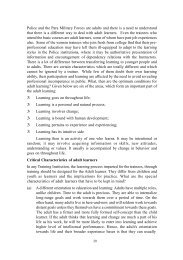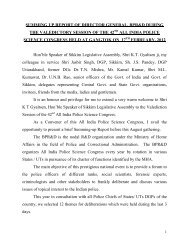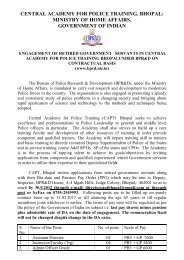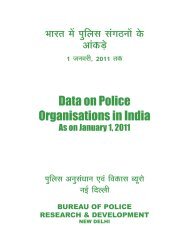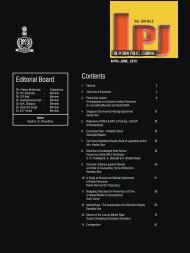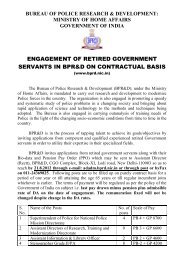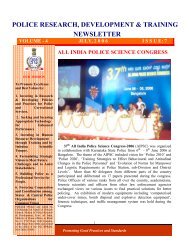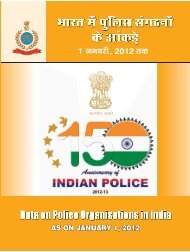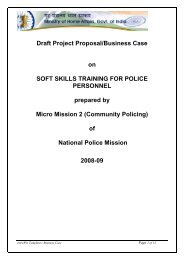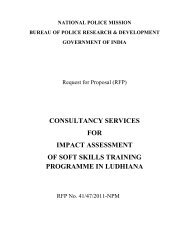including the Panchayati Raj <strong>and</strong> villagerevenue administration apparatus, village schoolteachers, <strong>and</strong> development workers, have losttheir integral <strong>and</strong> close linkages with the Thana,<strong>and</strong> information flows upwards have becomefitful <strong>and</strong> unreliable. This is <strong>of</strong>ten even morethe case where such intelligence flows are mostneeded, in regions <strong>of</strong> violence <strong>and</strong> disorder.An illusion <strong>of</strong> ‘intelligence’ may be created bymonitoring urban <strong>and</strong> political gossip centres<strong>and</strong> such ‘intelligence’ may even be quite usefulin drafting general risk assessments — but thereal substance <strong>of</strong> operational intelligence flowsfrom the grassroots, from rural <strong>and</strong> m<strong>of</strong>ussilconcentrations, or from the most degraded <strong>and</strong>neglected areas <strong>of</strong> the urban complex.The enormity <strong>of</strong> what can be achieved by the<strong>Police</strong> is illustrated by an interesting case in thelate 1960s, when the Naxalites were trying toestablish a foothold in Assam. In Kamrup, wewere able to break the emergence <strong>of</strong> Naxalism,because an alert constable, who was getting hisslippers repaired, saw a pair <strong>of</strong> shoes, wrapped ina Naxalite poster, which had also been given tothe same cobbler. A trap was laid <strong>and</strong> the owner<strong>of</strong> the shoes was arrested. His interrogation led tothe arrest <strong>of</strong> others, <strong>and</strong> systematically, the entirechain was broken, with a number <strong>of</strong> inter-Stateoperations <strong>and</strong> arrests also resulting from thisvery humble beginning. Ironically, the constablewas almost illiterate, <strong>and</strong> we had to exempt himfrom various requirements to promote him to thepost <strong>of</strong> ASI as a reward.It is the sensitivity <strong>and</strong> responsiveness <strong>of</strong> thisgrassroots apparatus that creates intelligencesuccesses <strong>of</strong> the highest order. Unfortunately,the problem, in substantial measure, is that thesystem, today, has come to be dominated by<strong>Police</strong> <strong>and</strong> intelligence bureaucrats; what it needsis leaders. The efficiency <strong>of</strong> an organisation can<strong>of</strong>ten be judged by the frequency at which its topleadership visits its most remote outposts, <strong>and</strong> bythis measure, it is unlikely that most State <strong>Police</strong><strong>and</strong> intelligence organisations can presently bejudged very positively.Effective <strong>Police</strong> leaders in some <strong>of</strong> the worstinsurgency-afflicted areas have, nevertheless,established highly efficient networks <strong>of</strong> listening<strong>and</strong> operational posts across their jurisdictions.Here, significantly, the internal-externaldichotomy is also found to be substantiallyfalse, <strong>and</strong> such leaders have been able to createlinkages across borders essentially through thepopulations that inhabit the border areas, <strong>of</strong>tenamong those who are notionally ‘sympathetic’to the insurgent cause. Through the extendedperiod <strong>of</strong> terrorism in Punjab, it was alwayspossible to keep very close tabs on the terroristleadership across the border through a number<strong>of</strong> intermediaries <strong>and</strong> informers. Among thosewho will betray their country, you will alwaysfind some who will betray their cause as well.I was, moreover, personally able to establishcontinuous contact with several <strong>of</strong> the terroristleaders holed up in Pakistan. I recall, also, thatin the early Sixties, as SP Naogaon, I was able toidentify <strong>and</strong> process the deportation <strong>of</strong> as manyas 300 illegal migrants from what was then EastPakistan (now Bangladesh) on the average day,<strong>and</strong> an overwhelming proportion <strong>of</strong> intelligencerelating to these came to me from other migrants,who had long been settled in the area. Crucially,there was also ample intelligence coming fromacross the border, regarding the resettlement <strong>of</strong>these expelled groups along the border, <strong>and</strong> theviolence that was orchestrated by them, at thebehest <strong>of</strong> Pakistani State agencies, against Hindusin those areas. Other <strong>Police</strong> leaders have beeneffective in doing as much, for instance, G.M.Srivastava in both Assam <strong>and</strong> Tripura, in the mostcrucial phases <strong>of</strong> the counter insurgencies there,had developed excellent capabilities both within<strong>and</strong> across borders. Similarly, the Andhra Pradesh<strong>Police</strong> has been instrumental in generatingeffective intelligence on the Maoists virtuallyacross the country, leading to arrests <strong>of</strong> topMaoists in the most widely dispersed locations.The ‘home advantage’ that a State <strong>Police</strong> Forcehas, <strong>and</strong> the linkages these can create evenbeyond borders, cannot easily be replicated bya central agency.These are not aberrations or deviations.There are imperatives <strong>of</strong> modern policing <strong>and</strong>intelligence operations, dictated by the verynature <strong>of</strong> contemporary security threats, <strong>and</strong> willbe ignored at terminal risk to the authority <strong>and</strong>capacity <strong>of</strong> the Indian State. With our proclivityto look westward for our ‘models’, it is useful,in this regard, to notice the response <strong>of</strong> the NewYork <strong>Police</strong> to the new challenges <strong>and</strong> threat88The Indian <strong>Police</strong> Journal, October - December, 2012, Special Issue
assessments that arose after the catastrophic 9/11attacks in that city. Over the intervening decade,the New York <strong>Police</strong> Department (NYPD) hasgone on to create what has been described asthe most powerful <strong>and</strong> technologically advancedcounter-terrorism bureau that anyone has everseen. First providing the rationale <strong>of</strong> what wasdone, NYPD Commissioner Ray Kelly stated,as far back as in February 2003, “We couldn’trely on the federal government alone. I believedthat we had to create our own counter-terrorismcapacity, indeed our own counter-terrorismdivision.” 1,2 Within the first years after the 9/11attacks, this Division was set up with a colossalcapacity for human <strong>and</strong> technical intelligencegathering, <strong>and</strong> exceptional technical capabilities,extending to the detection <strong>of</strong> extremely low levels<strong>of</strong> nuclear radiation <strong>and</strong> threat. Emphasising thecore <strong>of</strong> human intelligence gathering, the Divisionincludes personnel who speak 60 languages <strong>and</strong>dialects, <strong>and</strong>, crucially, posts its own <strong>of</strong>ficersacross the world.It is not the intention, here, to suggest that everyState <strong>and</strong> city in India must immediately rush<strong>of</strong>f to try to create comparable capacities. Oursolutions do not lie in imitating systems that haveresource capabilities that we cannot even imaginefor ourselves — though we may draw lessonseven from these. The point is, our capacities, ourcapabilities <strong>and</strong> our responses — including thedistribution <strong>of</strong> tasks within the system — mustbe dictated by the contours <strong>of</strong> the challenge<strong>and</strong> by the potential <strong>of</strong> the executive agencies,not by some prior distribution <strong>of</strong> immutablejurisdictions. The approach must be pragmatic,problem solving, not bureaucratic.None <strong>of</strong> this is, <strong>of</strong> course, intended to suggest thatthe Central Agencies are irrelevant or marginal tothe effort <strong>of</strong> intelligence gathering, or to nationalsecurity. Indeed, there is no either-or propositionhere. Both Centre <strong>and</strong> States have to developtheir capacities <strong>and</strong> capabilities to their maximumpotential. Each has certain natural advantages.I have had, through my career, extraordinaryepisodes <strong>of</strong> close <strong>and</strong> productive coordination,for instance, with the lB. During Operation BlackThunder, I was in daily contact with the NehchalS<strong>and</strong>hu, now the DIB, among others, <strong>and</strong> therewas an exemplary sharing <strong>of</strong> purpose <strong>and</strong>intelligence. Nevertheless, despite continuousinputs from the IB, the State intelligenceapparatus remained crucial for a completepicture <strong>of</strong> events. I must confess, moreover, thatthe extraordinary cooperation with the lB duringthe Black Thunder episode is not something thathappens <strong>of</strong>ten. The relationship between State<strong>and</strong> Central agencies tends to be mixed. They<strong>of</strong>ten operate independently <strong>of</strong> each other, <strong>and</strong>at least occasionally, at cross purposes, thoughexamples <strong>of</strong> successful collaboration are also notdifficult to locate.It is important to recognize, moreover, that bothState <strong>and</strong> Central agencies begin to harp on thequestion <strong>of</strong> m<strong>and</strong>ate only when they are unwillingor incompetent to do what is necessary, or whensomething goes abysmally wrong. Otherwise,there are perfectly healthy signs <strong>of</strong> coordination<strong>and</strong> cooperation, with joint operations betweenState <strong>and</strong> Central agencies, as well as betweenthe agencies <strong>of</strong> different States, executed withsurprising frequency <strong>and</strong> success. Indeed, it iswhen an acute lack <strong>of</strong> capacity, or <strong>of</strong> will, exists,that operations hobble <strong>and</strong> questions <strong>of</strong> turf beginto rankle.This is, increasingly, aggravated by a proclivity,everywhere, towards the eager abdication <strong>of</strong>responsibility, though the craving for power <strong>and</strong>pelf remains intense. There is a strong trend in thepopular discourse regarding the purported role<strong>of</strong> ‘the public’ in countering terrorism <strong>and</strong> crime,greater ‘public-private’ partnerships, <strong>and</strong> eventhe flogging <strong>of</strong>f or <strong>of</strong>f-loading <strong>of</strong> a range <strong>of</strong> <strong>Police</strong>functions to the private sector. This is not a subjectthat needs detain us here, though it is importantto emphasise, in passing, that an overwhelmingproportion <strong>of</strong> such proposals are misconceived,misdirected <strong>and</strong> counter-productive, <strong>and</strong> militateagainst the most fundamental <strong>and</strong> inalienableduty <strong>of</strong> the State to provide security <strong>and</strong> justiceto every citizen, irrespective <strong>of</strong> station or othergrounds <strong>of</strong> identity. While it is right for the <strong>Police</strong>to expect cooperation from citizens, the idea1. “Fighting Terrorism in New York City,” 60 Minutes, September 25, 2011http://www.cbsnews.comf2lOO-18560 162-2011 1059.html2. Craig Horowitz, “The NYPD’s War On Terror”, New York, February 3, 2003, http://nymag.comlnymetro/news/features/n 8286/.The Indian <strong>Police</strong> Journal, October - December, 2012, Special Issue 89
- Page 1 and 2:
The Indian Police JournalOctober -
- Page 3 and 4:
From the Director’s DeskNew Delhi
- Page 5 and 6:
23rd December, 1887: TheJourney beg
- Page 7 and 8:
Courtesy - National Archives of Ind
- Page 9 and 10:
The Logo released on the completion
- Page 11 and 12:
Helmsmen of the IB during thePre-In
- Page 13 and 14:
SHRI V.G. VAIDYA, IPS(MAR 1992 TO J
- Page 15 and 16:
“Sleeman sahib ki jai”“No Cri
- Page 17 and 18:
their life and their problems relat
- Page 19 and 20:
Settling down of criminal tribes wa
- Page 21 and 22:
perish. Between 1841 and 1848, anot
- Page 23 and 24:
In conclusion, I would like to reco
- Page 25 and 26:
own race alone, had to be withdrawn
- Page 27 and 28:
a bee in his bonnet” 17 , and abo
- Page 29 and 30:
epresented by Tilak and his followe
- Page 31 and 32:
The agency more and more fine-tuned
- Page 33 and 34:
US was brewing, one William Hopkins
- Page 35 and 36:
came under the control of Indian mi
- Page 37 and 38:
neutralised many efforts by inimica
- Page 39 and 40:
e published by the Intelligence Bur
- Page 41 and 42:
As DD (Security), IB, I had occasio
- Page 43 and 44:
Chhomohlohri, all of them juxtapose
- Page 45 and 46:
Dormers Building, ShimlaThe Dormers
- Page 47 and 48:
eforms. Warren Commission, on the a
- Page 49 and 50:
and systems will increasingly come
- Page 51 and 52: violence and destabilisation. This
- Page 53 and 54: one develop. The all pervasive cult
- Page 55 and 56: etween the states and the centre su
- Page 57 and 58: Intelligence Agencies inIndian Demo
- Page 59 and 60: Democracies are, today, everywhere
- Page 61 and 62: depend substantially on the restrai
- Page 63 and 64: Of Pistols and Pigs andthe Old Tidd
- Page 65 and 66: it is lovingly caressed hundreds of
- Page 67 and 68: Through the Eyes of an IB OfficerSh
- Page 69 and 70: an Intelligence agency. He used to
- Page 71 and 72: My J&K ExperienceShri R.K. Kapoor,
- Page 73 and 74: there. We remained stranded there f
- Page 75 and 76: Scaling Himalayan Heights withthe I
- Page 77 and 78: proceed to Dungti to supervise the
- Page 79 and 80: tour of the White House and Lincoln
- Page 81 and 82: into unconsciousness two hours earl
- Page 83 and 84: which was completed successfully wi
- Page 85 and 86: leaders. This happened around the t
- Page 87 and 88: My Unforgettable Yearsin the North-
- Page 89 and 90: stated that Prakash Singh, Assistan
- Page 91 and 92: take her into confidence. That woul
- Page 93 and 94: Police - Intelligence InterfaceShri
- Page 95 and 96: Shreekant Bapat and I surveyed the
- Page 97 and 98: excellence, dedication and commitme
- Page 99 and 100: Immigration, Inter-State Disputes,
- Page 101: Observations on India’s State and
- Page 105 and 106: levels. The deficiencies of one par
- Page 107 and 108: of laying a network of useful roads
- Page 109 and 110: Technology in Intelligence-Future S
- Page 111 and 112: These are just some of the aspects
- Page 113 and 114: Figure 6: Open Source Information o
- Page 115 and 116: events) and inference from evidence
- Page 117 and 118: 9North Atlantic Treaty Organization
- Page 119 and 120: Shri Dave was posted back to the lB
- Page 121 and 122: He even suggested separate pay scal
- Page 123 and 124: The Unsung HeroesThe Intelligence B



